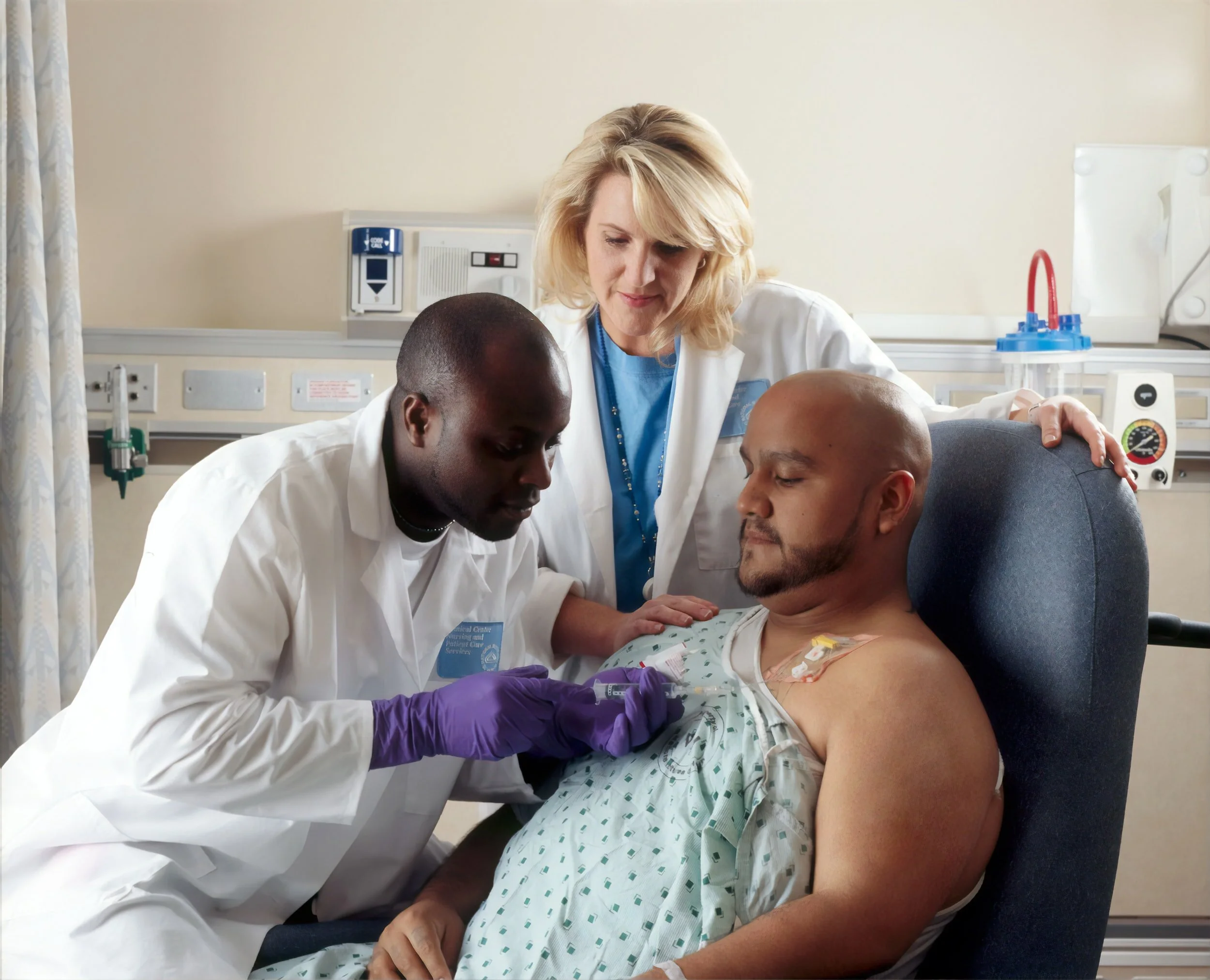Yoga Therapy for Cancer
Yoga therapy is a complementary therapy for people diagnosed with cancer. Complementary healthcare is not intended to be a curative treatment or a replacement for medical care. When it comes to navigating an illness, it is best to view your yoga therapist as a part of your care team alongside physical therapists, doctors, psychologists and any other healthcare provider you may need.
When many people hear the words yoga therapy, they may imagine a yoga class or envision alternative healthcare practitioners making wild claims about curing diseases with questionable methods. They may also be filled with many doubts and questions such as:
Yoga isn’t for me,
I’m not flexible enough,
I’m too tired,
I’m dealing with something serious, how can yoga therapy help?
Read on for answers to these concerns and an understanding of how yoga therapy for cancer can support the health and wellbeing of people experiencing cancer.
What is Yoga Therapy
Yoga therapy is a complementary therapy that blends modern science and wisdom traditions. As such, it is not a replacement for medical care.
It is tailored to the individual including their current physical capacity so that it can be done by absolutely everyone regardless of energy level or physical ability.
Yoga therapy is intended to support physical, psychological, emotional and social aspects of wellness.
You don’t have to have or embrace any particular beliefs in order to benefit from yoga therapy.
There are many approaches to yoga therapy. In this article, I describe yoga therapy as practiced by myself at Collaborative Motion.
You may find it useful to read 3 Myths about Yoga Therapy and Health to get a better understanding of the overall yoga therapy approach to health, wellness and illness as it relates to standard medical models.
The role of yoga therapy in cancer healthcare
The American Cancer Association describes cancer as “a complex group of diseases with many possible causes”. Its formation is related to the complex relationships between factors such as: genetics, epigenetics, diet, alcohol, smoking, physical activity, stress levels, trauma exposure, inflammatory state, immune functioning, gut microbiome, viruses, environmental carcinogens, contaminated food, UV radiation and more.
Cancer’s are generally divided into blood cancers (hematologic) and solid tumour cancers. When cancer is found, diagnostic tests will be carried out to determine what kind of cancer, how large it is and if it has spread. As a result, the cancer will be given a stage. The cancer type and stage are critical pieces of information in your doctor's determination of the type of treatment to use. In many cases, multiple treatments will be used to give the best rates of success. The cancer type, stage and treatment types will contribute heavily to the types of side effects you might experience.
In cases of cancer, yoga therapy is not aiming to be curative nor can it replace medical care. It aims to support a greater sense of emotional and physical wellbeing while navigating illness; it helps with navigating the process and reducing and/or navigating symptoms of illness and side effects of treatments.
Dealing with cancer is a journey from discovery, diagnosis, cycles of treatment, ongoing tests, supportive therapies, treatment of side effects and eventually remission or end of life care and integrating the whole experience over time. People turn to yoga therapy at different phases of this journey.
For people experiencing cancer, yoga therapy supports:
Wellbeing during and after the journey with cancer
The body’s natural healing capacity
Creating optimal conditions for the success of primary treatments
Mental preparation for treatment procedures
Reduction and/or navigation of treatment symptoms
Personal agency in navigating the process
How can yoga therapy support people with cancer
The yoga therapist supports you and is not qualified to offer advice counter to your medical professionals. The yoga therapist will support you in your decisions while adhering to any recommendations your other care providers may give you. Standard yoga therapy tools include: assessments, breathing exercises, movement, lifestyle recommendations, relaxation, visualisation, sound, embodied ethics, self-study, mindfulness, meditation, self-compassion, yoga philosophy and more. Yoga therapists may be licensed or certified in other modalities which they can draw from when applicable. For example, as a certified coach, mindfulness instructor and compassion trainer, I may draw from these toolkits when working with clients.
Through the use of these tools, the yoga therapist can support with:
Preparing for and managing cancer diagnosis and treatments
Rest and restoration throughout the process
Important healthy gentle movements
Reducing decline of bone and muscle strength and active range of motion
Reducing stress and inflammation in body
Healthy breathing
Managing uncomfortable side effects such as: sleeplessness, anxiety, neuropathy, digestion troubles, pain, fear and more
Increased sense of agency and self-efficacy
Self-study - getting to know your body and what is impacting it during your journey
Living in the possibilities of what you can do
Yoga therapy to prepare for and manage cancer diagnosis and treatments
When one is diagnosed with cancer, it is normal to experience a range of emotions such as anger, fear, worry, sadness, guilt, depression, relief, or gratitude. Yoga therapy can support you with the emotional process throughout the journey.
Preparing for diagnostic scans, surgery, or treatments such as chemotherapy can feel scary and nerve racking. You may not know what to expect. Yoga therapy can support you with preparing physically and emotionally for the process of scans, chemotherapy administration, and more.
Managing side effects of cancer treatments with yoga therapy
There are many physical and psychological side effects one might experience as a result of cancer treatments. Depending on the treatment, one might experience: pain, increased sensitivity, neuropathy (lost sensation in parts of the body), exhaustion, fatigue, difficulty concentrating and focusing, digestion problems, sleep difficulty, recovery from surgery, hair loss and more. Yoga therapy can support you in navigating these symptoms as well as reducing many of them.
It is useful to acknowledge both the physical and the psychological/emotional journey that one goes through when diagnosed with cancer. Many people find that cancer is a period in which they begin to re-evaluate and take inventory of their life.
In some cases, they find that the diagnosis enables them to take a new responsibility for being alive and for being present to the life they have. They may change habits and lifestyle to better support their health, they may face unfinished business in relationships, and they may choose to face their fears - including those of pain or death. Yoga therapy can support this process as well. Sometimes alongside the support of a therapist.
Yoga therapy for health and wellbeing through the cancer journey
Critical to every journey with cancer is the ability to get adequate rest and physical movement along with navigating the psychological and emotional aspects of the process. Yoga therapy offers a therapeutic relationship and tools which will support you with each of these. Additionally, yoga therapy can support you with finding ways to live authentically and aligned with your values, strengths and goals which is critical to your resilience and overall wellbeing even as you deal with an illness like cancer.
Conclusion
There are many ways that yoga therapy can support you or your loved ones when navigating a journey with cancer. While this article is not exhaustive, it aims to offer an understanding of what yoga therapy is and how it can support people with cancer and their loved ones. Feel free to get in touch with any questions about yoga therapy or to explore yoga therapy for yourself.
Further resources about yoga therapy for people experiencing cancer
Yoga as medicine by Timothy McCall
Yoga for Cancer by Tari Prinster
A year to live by Stephen Levine
Being with dying by Joan Halifax

